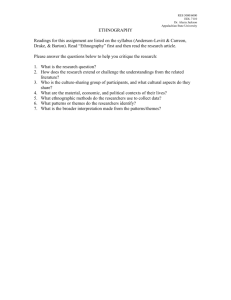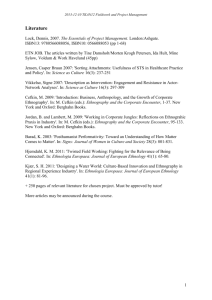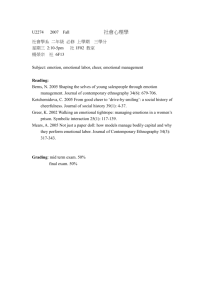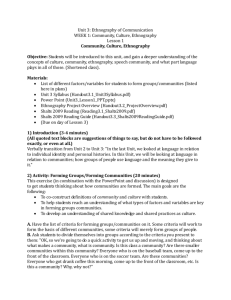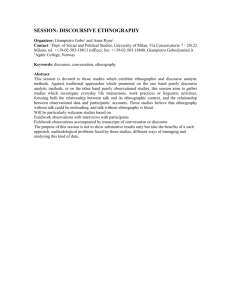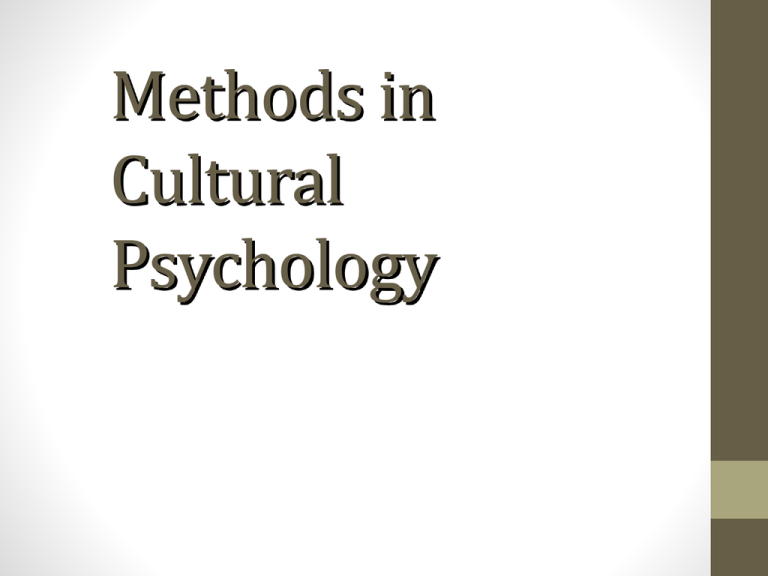
Methods in
Cultural
Psychology
From what perspective is your
question being asked?
• Emic vs. Etic
An "emic" account of behavior is a description of
behavior in terms meaningful (consciously or unconsciously)
to the actor, the insider view. An "etic" account is a description
of a behavior in terms familiar to the observer, the outsider
view. ..
The World Population by Region (2008)
Oceania 1%
Africa 13%
North America 5%
Latin America 9%
Europe 9%
Former USSR 5%
Asia 60%
U.S. Population by Ethnicity (of the 5 %)
Hispanic 11.5%
Asian/other
4.5%
Black
12.1%
White
71.9%
1999
Hispanic
18.2%
Asian/other
7%
White
62%
Black
12.9%
2025
Wierdos
Non-Wierdos
Western, Industrialized, Educated, Rich, Democratic
• 67% of studies in US
from 2003-2007
• 80% of studies from
Europe
• (Heinrich & Heine, 2009)
Some other combination
• Make up overwhelming
majority of the world.
How do we include “culture?” Who
studies culture?
Cross-cultural psychologists
Cultural psychologists
Indigenous psychologists
Cross cultural psychology
Defn: study of similarity and differences across groups
Goals:
Transport and test
Explore and discover
Integrate
Assumptions/Characteristics:
Universality
Mainstream
What brings about variations between countries?
Culture
Cultural Psychology
• Focuses on culture and how it is transmitted (alternatively,
how we become members of a culture group)
Goal: uncover culture and how it is manifested
Does not assume universality
Culture
CROSS
CULTURAL
CULTURAL
Gambling cognition and subjective well-being as mediators between perceived
stress and problem gambling: A cross-cultural study on White and Chinese
problem gamblers.
Authors:Tang, Catherine So-kum, Department of Psychology, National University of
Singapore, Singapore, tang.catherine@nus.edu.sg
Oei, Tian Po, School of Psychology, University of Queensland, Brisbane, QLD,
Australia
This study aimed to delineate various pathways whereby cognitive and emotional
vulnerabilities triggered by stress would lead to disruptive gambling. A multiple
mediation framework was proposed to specify that gambling cognition and
subjective well-being would mediate the influence of perceived stress on problem
gambling. The cross-cultural validity of the proposed framework was examined
with 132 White gamblers in Australia and 154 Chinese gamblers in China. They
completed psychological scales on perceived stress, gambling expectancy bias,
gambling refusal efficacy, negative affect, life satisfaction, and problem gambling.
Compared to Chinese gamblers, White gamblers reported higher levels of
perceived stress, gambling expectancy bias, and problem gambling as well as
more pervasive negative affect and lower levels of life satisfaction. Results showed
that the proposed multiple mediation framework fit the data better than two
alternative plausible models. Life satisfaction and gambling refusal efficacy were
two consistent mediators across White and Chinese gamblers. (PsycINFO
Database Record (c) 2013 APA, all rights reserved)
Folk Theories of Happiness: A Cross-Cultural
Comparison of Conceptions of Happiness in Germany
and South Africa
Jan Pflug
Accepted: 11 August 2008 / Published online: 27 August 2008
Springer Science+Business Media B.V. 2008
Abstract
Although happiness as a state of mind may be universal, its meaning takes
culture-specific forms. Drawing on the concept of folk theories, this study attempted to
uncover lay beliefs about the nature of happiness in Germany and South Africa. To that
end, 57 German and 44 black South African students wrote free-format essays in response
to the question: ‘‘What is happiness to you?’’ Using thematic analysis the following themes
were found: (1) satisfaction; (2) contentment; (3) positive affect; (4) social relationships;
(5) freedom; and (6) the opposite of unhappiness. In addition, German respondents
defined happiness in terms of (7) surprising events. The exact meaning content of the
abovementioned dimensions showed clear influences of individualism/collectivism.
However, strong culture-specific factors, such as the influence of philosophical traditions,
material living circumstances and linguistic influences, were also found.
Keywords Happiness Folk theory Germany South africa
Some examples
•
•
•
•
Parenting styles
Morality
Intelligence
Parental belief systems
Indigenous psychology
• Psychology that is native, not transported
• Theories and methods are designed by and for its people
• Aim: eventually … a universal Psychology
Definition of concepts
• Hypothesis: A tentative statement, subject to empirical test,
about the expected relationship between variables.
• Independent variable: The variable that is manipulated in an
experiment. The independent variable is believed to have an
impact on the dependent variable.
• Dependent variable: The variable measured in a study.
Direction of relationship between
variables
• Positive = “same direction”
• Negative = “opposite direction”
• The positive or negative relationship between two variables is
called a correlation (poistive or negative).
• Correlation is represented by the coefficient r
• Conveys magnitude (value of r) and direction (- or +) Ex: correlation
between hours of sleep and energy level is r=.60 (0 < r < 1)
• Correlations do not imply a causal relationship
Experimental Research Design
• Experimental design: Research in which independent variables
are manipulated and behavior is measured while all other
variables (extraneous variables) are controlled for.
• Random sampling: Drawing from the population in a way that
ensures equal opportunity for every member to be included in
one or more conditions of the experiment.
Experimental Research Design
(cont).
• Control Group: A group of subjects in an experiment that
does not receive the experimental treatment. The data from
the control group are used as a baseline against which data
from the experimental group are compared.
Quasi-experimental Design
• Quasi-experimental design: An experiment in which the
participants cannot be randomly assigned to conditions of the
experiment, because the levels of the independent variable
are determined by the participant.
• Ex: if independent variable is culture
Validity
• Validity: The extent to which a measuring instrument
measures what it is supposed to measure. This is often an
issue in cross-cultural studies.
• Validity concerns for cultural psych
• Ecological validity: the degree to which a research procedure elicits
data that is representative of behavior outside the research context.
• Theoretical Validity: The degree to which the theory of a concept is
relevant to the way that concept takes form for a particular cultural
group.
Translation
• Shweder’s shy example
• One primary investigator is fully bilingual
• If, not, Back Translation
Let’s try it
• Need two bilingual betas. (please leave the room
• Lets come up with something to translate.
Moderacy effect, Extremity effect
• Response styles independent of content
• Moderacy= choosing items close to midpoint
• Extremity= choosing items on the end of scale
• Cultural differences, language differences
Acquiescence Bias, Reference Group Bias
• Acquiescence bias= Tendency to agree with most statements
• Reference group=different cultures compare themselves using
different reference groups
• I am successful?
• 1
2
3
Not at all
4
5
somewhat
6
7
very
Deprivation effects
• Hard to study values:
• Look at what people actually have in contrast to
what they would like to have
• Personal safety
• Can look within culture (share response bias, and
deprivation effects) but makes between culture
comparison difficult
Country vs. Rock
• http://www.cmt.com/videos/johnny-cash/334882/folsomprison-blues-pete-rock-remix.jhtml?id=1603360
• http://www.youtube.com/watch?v=nE11Zrrp24I
John Whiting
• Unpacking culture= identifying the underlying
variables that give rise to the cultural difference
• Not just that upper class people value uniqueness
and lower class value resiliency, but our daily
practices of music are a reflection and creation of
these differences.
Reliability
• Reliability: The extent to which similar results can be
reproduced repeatedly in identical circumstances.
Methodological goals for CP
• To develop methods and concepts that derive from the
culture itself.
• This ensures that the methods and concepts captures
the meanings and motives of behaviors that only an ingroup would understand.
• The key is to capture what is meaningful.
• To study cultural process: “creation of shared knowledge,
activities, conventions, and meanings through
communication and social interaction.” (culture is not a
superficial independent variable).
CP’s Methodological philosophy
• Importance of first hand ethnography and participant
observation
Ethnography:
Definition and Background
• The purpose of ethnography is to describe and
interpret the shared and learned patterns of
values, behaviors, beliefs, and language of a
culture-sharing group (Harris, 1968)
• Agar (1980) notes that ethnography is both a
process and an outcome of the research
• Ethnography involves extended observations of
the group in which the researcher is immersed in
their daily lives
Ethnography:
Definition and Background
• Ethnography begin in the early 20th century in comparative
anthropology
• Today subtypes of ethnography include structuralism and
symbolic interactionism that have different theoretical
orientations and aims
Types of Ethnographic Studies:
Realist Ethnography
• The approach is the traditional
approach to
ethnography
• The account of the situation is objective and written
in the third person
• The ethnographer remains in the background and
reports the facts
• The details of daily life often provided
• The ethnographer produces participant views through
closely edited questions and has the final word on
how culture will be interpreted
Types of Ethnographic Studies:
Critical Ethnography
• The goal is the advocacy and the emancipation of
marginalized groups
• The orientation in the study is value-laden The status quo is
challenged
• The concerns of power and control are addressed
• The issues of power, empowerment, inequality, dominance,
repression, hegemony, and victimization are studied
Ethnography Research Procedures
(Wolcott 1999)
• Determine if ethnography is the appropriate research
design for the problem
• Identify and locate a culture-sharing group to study
• Select cultural themes to study about the group (e.g.,
enculturation, socialization, learning, domination)
• Begin by examining people in interaction in ordinary settings
• Culture is inferred by the researcher by looking at what people
do and say and the potential tensions between what they do
and ought to do, and their artifacts
Ethnography Research Procedures
(Wolcott 1999)
• Determine the type of ethnography (realist or critical)
• Gather data where the group works and lives (field
work)
•
•
•
•
Gather information where the group lives and works
Respect the individuals at the research site
Collect many sources of data
Analyze the data for a description of the group focusing
on a single event and then moving into overall themes
• The final product is a wholistic portrait of the group that
incorporates both the views of the participants (emic) and the
views of the researcher (etic)
Nisa
Advantages of the
cross-cultural method and the study of other
cultures
• 1) To see if findings in one context extends to other
populations
2) Increases range of variation
(Sears & Wise, 1935)
• Kansas city kids
• + relationship between age of weaning and emotional disturbance
% cases about the media amount of
emotional disturbance
60
50
40
30
20
10
0
0-2
wks
2 wks
to 3
mos
4 to
12
mos
13 to
18
mos
Age of weaning
% cases about the media amount of
emotional disturbance
(Whiting & Whiting, 1953): 75 societies
100
90
80
70
60
50
40
30
20
10
0
0-2
wks
2 wks3 mos
4-12
mos
1318
mos
1924
mos
Age of weaning
25 30
mos
3136
mos
36
+mo
s
3) Find new variables/”invisibles”
Individualism/ collectivism
Journal Question
• Does your experience or your personal qualities incline you
towards one method or the other? Please think of your
strengths and weakness and how they might contribute to you
choosing cross cultural methods or cultural psychological
methods


